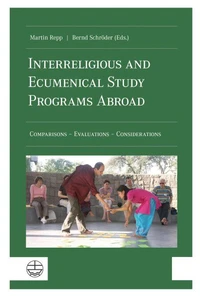Der eine Gott und die anderen Götter. Eine historische und systematische Einführung in Religionstheologien der Ökumene
Par :Formats :
Disponible dans votre compte client Decitre ou Furet du Nord dès validation de votre commande. Le format PDF est :
- Compatible avec une lecture sur My Vivlio (smartphone, tablette, ordinateur)
- Compatible avec une lecture sur liseuses Vivlio
- Pour les liseuses autres que Vivlio, vous devez utiliser le logiciel Adobe Digital Edition. Non compatible avec la lecture sur les liseuses Kindle, Remarkable et Sony
 , qui est-ce ?
, qui est-ce ?Notre partenaire de plateforme de lecture numérique où vous retrouverez l'ensemble de vos ebooks gratuitement
Pour en savoir plus sur nos ebooks, consultez notre aide en ligne ici
- Nombre de pages468
- FormatPDF
- ISBN978-3-374-07024-4
- EAN9783374070244
- Date de parution01/10/2021
- Protection num.Digital Watermarking
- Taille3 Mo
- Infos supplémentairespdf
- ÉditeurEvangelische Verlagsanstalt
Résumé
Angesichts der rapiden religiösen Pluralisierung Europas in den letzten Jahrzehnten wurden Religionstheologien entwickelt, die meist in die Kategorien von religiösem "Exklusivismus", "Inklusivismus" und "Pluralismus" auseinanderfallen. Zugleich werden im heutigen Diskurs frühere Ansätze ignoriert. Historische Untersuchungen jedoch zeigen erstens, dass Religionstheologien von Beginn der Kirche an entwickelt wurden, da Christen sich ihres Glaubens immer gegenüber anderen Religionen vergewissern mussten, und zweitens, dass sie auf den beiden Pfeilern der Soteriologie (Christologie) und der allgemeinen Kosmologie (Schöpfungstheologie) basierten, welche die Gemeinsamkeiten wie auch die spezifischen Unterschiede zu anderen Religionen klarstellten.
Weitere Ergebnisse sind, dass die theoretische Religionstheologie und der praktische Religionsdialog einander bedingen und dass beide auf den Religionsfrieden abzielen. [The One God and the Other Gods. A Historical and Systematic Introduction to Theologies of Religions in the Ecumenical Christianity] In response to the rapid religious pluralization of Europe during the last decades theologies of religion(s) were developed which diverge into the categories of religious "exclusivism", "inclusivism", and "pluralism".
At the same time the present discourse mostly ignores previous theological approaches. Historical investigations show, however, first that theologies of religion were developed from the beginning of the church on because Christians always had to ascertain their faith when facing other religions, and second that they were based on the two pillars of soteriology (Christology) and general cosmology (theology of creation) whereby the commonalities as well as the specific differences from other religions became apparent.
Moreover, the theoretical theology of religions and the practical interreligious dialogue condition each other and both ultimately aim at peace among religions.
Weitere Ergebnisse sind, dass die theoretische Religionstheologie und der praktische Religionsdialog einander bedingen und dass beide auf den Religionsfrieden abzielen. [The One God and the Other Gods. A Historical and Systematic Introduction to Theologies of Religions in the Ecumenical Christianity] In response to the rapid religious pluralization of Europe during the last decades theologies of religion(s) were developed which diverge into the categories of religious "exclusivism", "inclusivism", and "pluralism".
At the same time the present discourse mostly ignores previous theological approaches. Historical investigations show, however, first that theologies of religion were developed from the beginning of the church on because Christians always had to ascertain their faith when facing other religions, and second that they were based on the two pillars of soteriology (Christology) and general cosmology (theology of creation) whereby the commonalities as well as the specific differences from other religions became apparent.
Moreover, the theoretical theology of religions and the practical interreligious dialogue condition each other and both ultimately aim at peace among religions.
Angesichts der rapiden religiösen Pluralisierung Europas in den letzten Jahrzehnten wurden Religionstheologien entwickelt, die meist in die Kategorien von religiösem "Exklusivismus", "Inklusivismus" und "Pluralismus" auseinanderfallen. Zugleich werden im heutigen Diskurs frühere Ansätze ignoriert. Historische Untersuchungen jedoch zeigen erstens, dass Religionstheologien von Beginn der Kirche an entwickelt wurden, da Christen sich ihres Glaubens immer gegenüber anderen Religionen vergewissern mussten, und zweitens, dass sie auf den beiden Pfeilern der Soteriologie (Christologie) und der allgemeinen Kosmologie (Schöpfungstheologie) basierten, welche die Gemeinsamkeiten wie auch die spezifischen Unterschiede zu anderen Religionen klarstellten.
Weitere Ergebnisse sind, dass die theoretische Religionstheologie und der praktische Religionsdialog einander bedingen und dass beide auf den Religionsfrieden abzielen. [The One God and the Other Gods. A Historical and Systematic Introduction to Theologies of Religions in the Ecumenical Christianity] In response to the rapid religious pluralization of Europe during the last decades theologies of religion(s) were developed which diverge into the categories of religious "exclusivism", "inclusivism", and "pluralism".
At the same time the present discourse mostly ignores previous theological approaches. Historical investigations show, however, first that theologies of religion were developed from the beginning of the church on because Christians always had to ascertain their faith when facing other religions, and second that they were based on the two pillars of soteriology (Christology) and general cosmology (theology of creation) whereby the commonalities as well as the specific differences from other religions became apparent.
Moreover, the theoretical theology of religions and the practical interreligious dialogue condition each other and both ultimately aim at peace among religions.
Weitere Ergebnisse sind, dass die theoretische Religionstheologie und der praktische Religionsdialog einander bedingen und dass beide auf den Religionsfrieden abzielen. [The One God and the Other Gods. A Historical and Systematic Introduction to Theologies of Religions in the Ecumenical Christianity] In response to the rapid religious pluralization of Europe during the last decades theologies of religion(s) were developed which diverge into the categories of religious "exclusivism", "inclusivism", and "pluralism".
At the same time the present discourse mostly ignores previous theological approaches. Historical investigations show, however, first that theologies of religion were developed from the beginning of the church on because Christians always had to ascertain their faith when facing other religions, and second that they were based on the two pillars of soteriology (Christology) and general cosmology (theology of creation) whereby the commonalities as well as the specific differences from other religions became apparent.
Moreover, the theoretical theology of religions and the practical interreligious dialogue condition each other and both ultimately aim at peace among religions.



